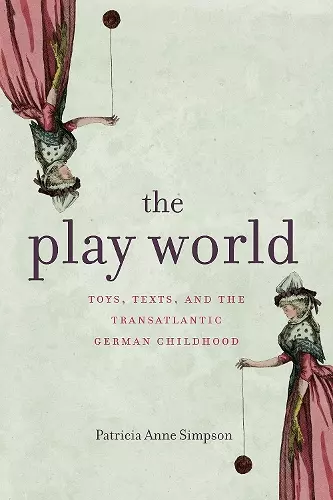The Play World
Toys, Texts, and the Transatlantic German Childhood
Format:Hardback
Publisher:Pennsylvania State University Press
Published:21st Sep '20
Currently unavailable, and unfortunately no date known when it will be back
This hardback is available in another edition too:
- Paperback£29.95(9780271087009)

The Play World chronicles the history and evolution of the concept of play as a universal part of childhood. Examining texts and toys coming out of Europe between 1631 and 1914, Patricia Anne Simpson argues that German material, literary, and pedagogical cultures were central to the construction of the modern ideas and realities of play and childhood in the transatlantic world.
With attention to the details of toy manufacturing and marketing, Simpson considers prescriptive texts about how children should play, treat their possessions, and experience adventure in the scientific exploration of distant geographies. She illuminates the role of toys—among them a mechanical guillotine, yo-yos, hybridized dolls, and circus figures—as agents of history. Using an interdisciplinary approach that draws from postcolonial, childhood, and migration studies, she makes the case that these texts and toys transfer the world of play into a space in which model childhoods are imagined and enacted as German. With chapters on the Protestant play ethic, enlightened parenting, Goethe as an advocate of play, colonial fantasies, children’s almanacs, ethnographic play, and an empire of toys, Simpson’s argument follows a compelling path toward understanding the reproduction of religious, gendered, ethnic, racial, national, and imperial identities, emanating from German-speaking Europe, that collectively construct a global imaginary.
This foundational and deeply original study connects German-speaking communities across the Atlantic as they collectively engender the epistemology of the play world. It will be of particular interest to German studies scholars whose research crosses the Atlantic.
“A valuable intervention in the historiography of German childhood and play. Simpson’s argument has tremendous sweep: exploring changes in childhood and parenting over centuries, the role of play in child development, the deployment of racial and imperial images, the circulation of images and toys across the Atlantic, and the decline of German influence on images of childhood in the twentieth century.”
—David Hamlin German History
“The Play World is an engaging read with a compelling argument about the unique contribution of German arts and letters—through toys, children’s literature, and pedagogical texts—that offers a new understanding of the role of play in modern childhood.”
—Maureen O. Gallagher German Studies Review
“Simpson not only breaks ground for the critical study of the role of play and toys in the formation of modern German and American culture, paying special attention to the 18th and 19th centuries, but she also resists the lure of an easy narrative. Instead, her book reminds us how complicated, conflicted, and barely progressive this story of play and toys was.”
—Willi Goetschel The Germanic Review
“Simpson’s book is a welcome addition to discussions of the importance of the domestic sphere, and its artifacts and practices, for questions of cultural nationalism and transnational interplays. It shows the impact of toys and play on narratives of migration, the articulation of middle-class subjectivity, and the role of model childhoods in the self-identity of modern European family structures—and how they influenced European American family structures in their acquisition of racial, ethnic, and national regimes.”
—Karin A. Wurst, author of Fabricating Pleasure: Fashion, Entertainment, and Cultural Consumption in Germany, 1780–1830
“Within the burgeoning scholarship on play and the material culture of childhood, Simpson’s The Play World stands out through its attention to a breathtaking range of texts and artifacts that lie at the margins of the canon; its brilliantly eclectic methodology (combining literary, material, and intellectual history with postcolonial studies, critical race theory, gender studies, disability studies, and much more); and its ability to illuminate complex cultural and commercial currents that connect German-speaking Europe with Africa, Great Britain, and the Americas from the seventeenth century to WWI. It’s a remarkable book that will resonate within and beyond the field of childhood studies.”
—Elliott Schreiber, co-editor of Play in the Age of Goethe: Theories, Narratives, and Practices of Play around 1800
“[A] fascinating read for scholars of the transatlantic world, of Germany, and of parenting, and it importantly cements German imperialism not as a fact to be debated but as clearly constitutive of familial and (trans)national identities.”
—Amanda M. Brian H-Transnational German Studies
ISBN: 9780271086996
Dimensions: 229mm x 152mm x 28mm
Weight: 590g
312 pages